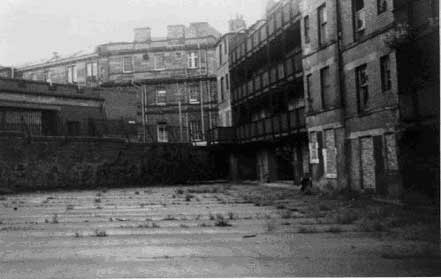|
Memories of a childhood in wartime Leith. The trials and tribulations of the period, allied to the camaraderie of the community in facing up to an uncertain future made a lasting impression on John Stewart.
Our summer break of seven weeks away from school was utilised to the full during this war period. Corstorphine Wood was a favourite haunt of ours. The No 12 tramcar from the Foot of the Walk took us direct to our destination.
The journey was not always uneventful. Our preferred seats were at the front of the upper deck immediately above the driver. Flushed with the excitement in anticipation of what lay ahead, the noise we created would often have the driver stop the car and threaten to have us put off. I suppose we did quieten down, for we were never ejected.
On reaching the woods, our favourite game was simulating the adventures of Robin Hood, the film of which starring Errol Flynn was still currently being shown.
Our elders would have died had they known that we inserted nails into our arrows for greater effect. Only one accident arose from this practice and that was to Jock Scullion.
An arrow pierced his knee and remained impaled until he reached Leith Hospital. I can't remember the doctor or nurse's comments on it.
Football was our main pastime, mostly played with an old tennis ball, believe it or not. Our 'home' pitch was the square in the middle of the Corporation Buildings.
The 'coppy', the colloquial name for three polished red brick tenements of four storeys each with communal balconies at the rear that looked inwards towards each other, thus forming the square.
Clotheslines were slung back and forth across the divide at all levels by means of ropes and pulleys. We were not supposed to play football here, and the resident caretaker, 'auld Broonie' was forever shouting at us.
We never spoke back to him unless in a pleading vein, but this only fell on deaf ears. We just stopped playing until he returned indoors.
The 'coppy' or 'buildings' as it was sometimes called, was the home to 84 families of varied sizes. None of the houses had any more than two rooms although they each had an inside toilet. None had electricity or running hot water. Gaslight was the norm during the War. 
The Coppy before demolition in 1981. Leith Hospital at rear.
A communal washhouse was situated beneath one of the blocks. As well as providing the washing facility, it was also a place for gossip exchange.
Although the area was Protestant and Catholic in equal ratio, no sectarianism was apparent except when sides were picked for football. Catholics against the Proddies. On the contrary, the two sides got on well together and each was dependant on each other.
To highlight an instance of this, take old Mrs Grant, Mrs Connolly and Mrs Urqhart. These three ladies administered invaluable service to the community whenever births or deaths occurred.
A family faced with an emergency such as these would immediately send out a cry for them. They acted as midwives to those in labour as well as preparing a deceased person before the undertaker called. My own grandmother was one such latter case.
In those days most children were ignorant of how babies came about. I was no exception. Future mums only got fat. I was told babies were brought to Leith on the boat from London and the doctor collected it there and brought it to the house in his black bag.
My young cousin was born on 2nd June 1942 and I was told that the London Boat had just arrived. I just took it for granted.
John Stewart, 2001
| |


